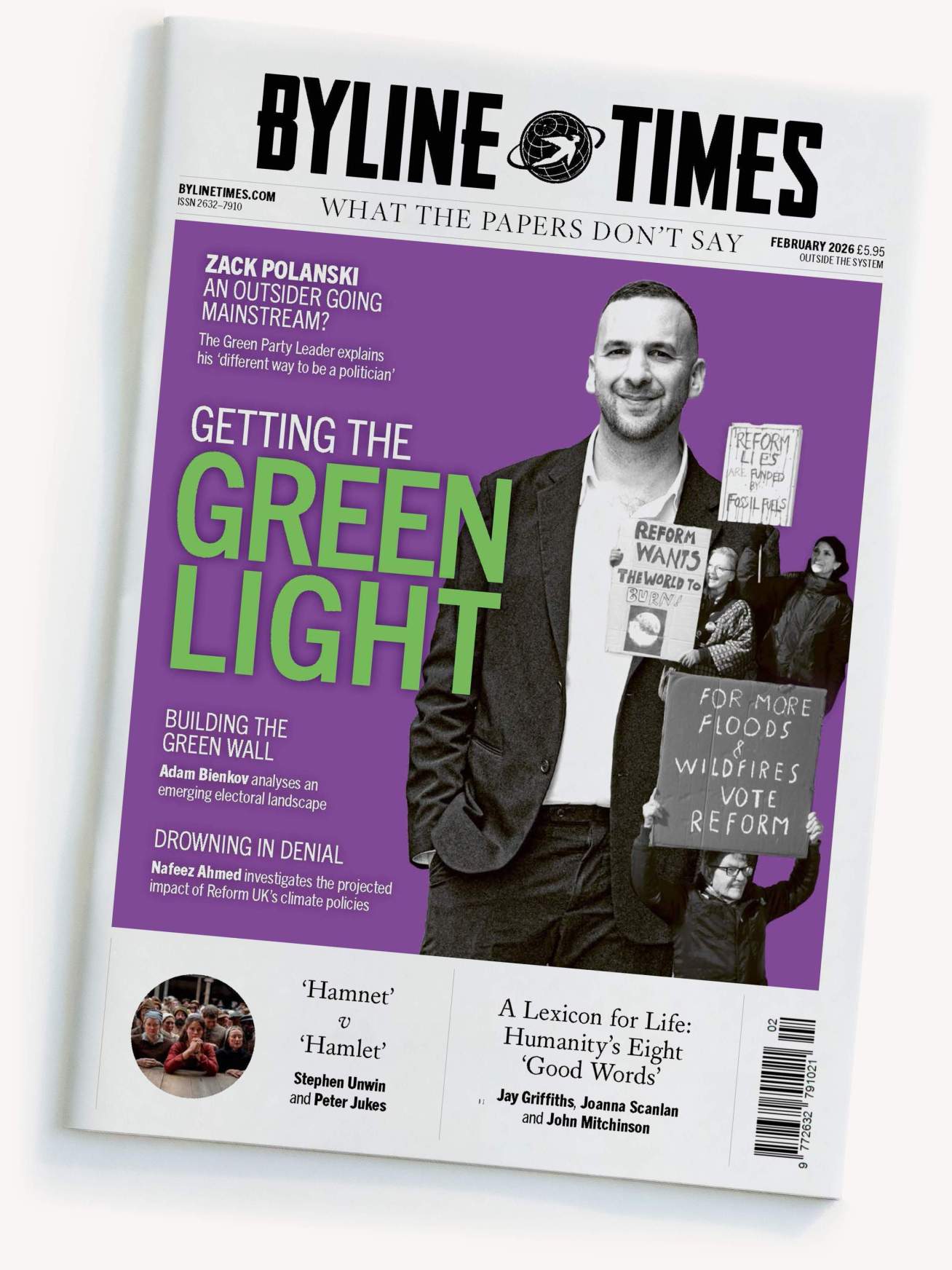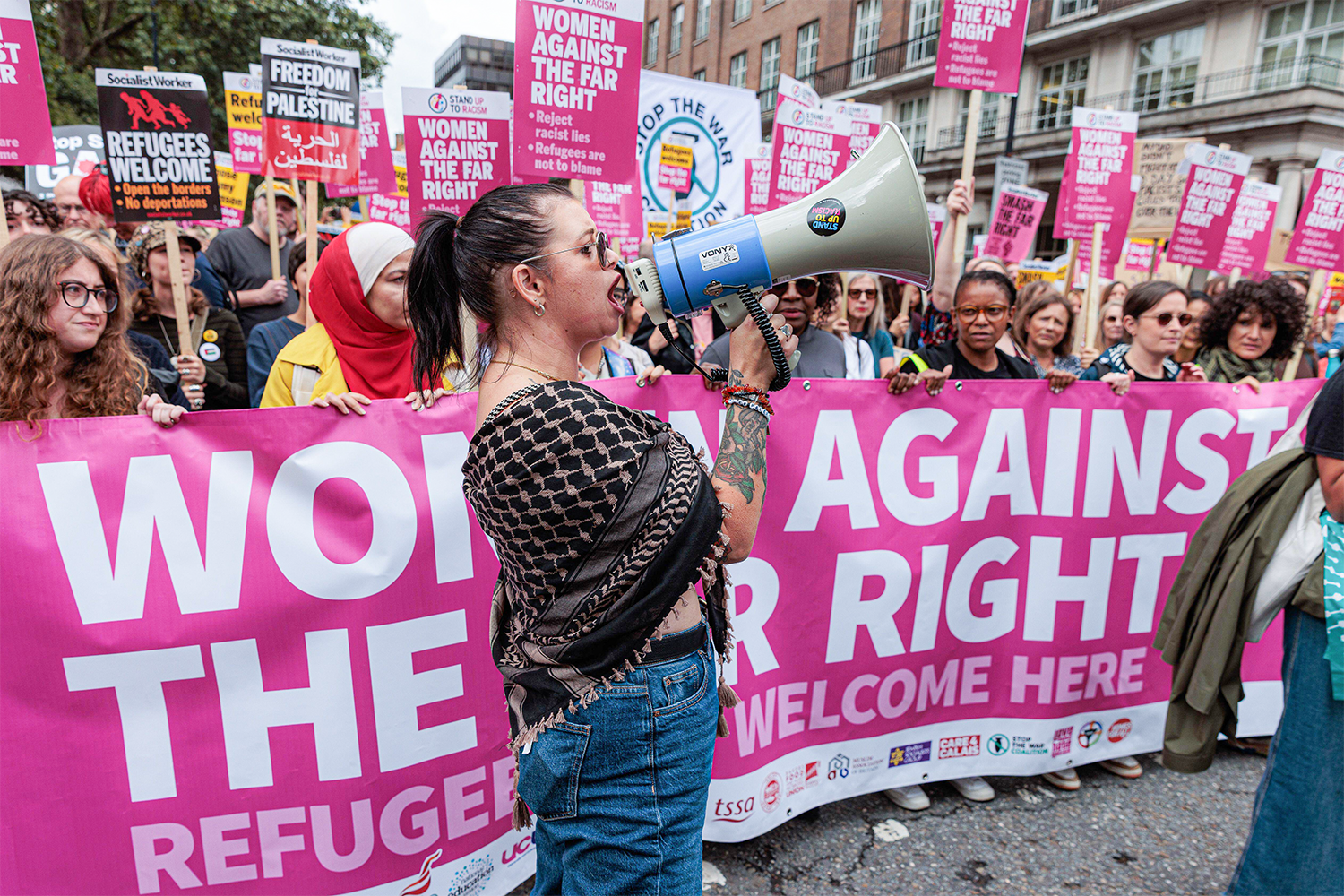
Read our Monthly Magazine
And support our mission to provide fearless stories about and outside the media system
When 100,000 people marched through London last Saturday for the far-right “Unite the Kingdom” rally, it was the first time I felt grateful for the fact I broke my foot a few weeks ago and am currently house-bound. I had already experienced a summer of missing out, and was feeling quite sorry for myself going into September. But on Saturday, as a woman with brown skin, I was thankful that I didn’t have to pretend to feel brave and step outside – because the truth is, I didn’t. I felt dread, anxiety and fear.
The march, facilitated by convicted far-right criminal Stephen Yaxley-Lennon (most commonly known as Tommy Robinson), and the events that led up to it, have dominated media recently – both legacy and social. The campaign to hang England flags on every UK lamppost and roundabout, the mobs outside hotels housing asylum seekers, the hypocritical cries of ‘save our women and children’. But absent from the coverage was the profound impact this was having on communities of colour. This was and continues to be completely underrepresented in the media.
Where was the outrage about the British born Sikh woman, raped by two white men in a racially aggravated attack in Birmingham? Where was the outrage about the brown women chased during the far-right march, as one man yells “smack her, smack her”? Or the nine-year old girl left traumatised in Bristol after being hit three times in a racist airgun attack, or the Muslim couple verbally abused by a white elderly man in Leicester?
Why were counter-protestors so outnumbered at the far-right march?
There are many factors, but a key one is mobilisation. It is easy for the likes of Tommy Robinson and Nigel Farage to galvanise their fan base, energising people under broad, sweeping statements, pointing the finger at those with far less power than themselves, and disregarding logic and accurate information. It’s not about immigration in any factual sense: the migrant crimewave these pundits decry is fiction – though the number of immigrants in Britain has doubled over 20 years, over this time, surveys show the amount of crime has actually halved, and there is no substantial evidence to show that immigrants are more likely to commit crime than British nationals.
Anti-migrant marchers often use this false narrative to frame their rage in defence of women’s safety – yet as marchers in one breath shouted ‘save our women!’, in the other they shouted misogynistic chants of ‘get your tits out for the lads!’.
Keir Starmer should recognise these falsehoods and stop attempting to fight racist violence with xenophobic rhetoric and policies. It’s not about migrants, and it’s not about women’s safety – it’s about people desperately wanting to belong to something.
John, who now works for the charity Exit Hate which helps people leave far-right groups, fell into the grips of the radicalised right by sharing a post on Facebook: ‘Share this if you think British soldiers shouldn’t be on the streets’. “I had an uncle at the time who was struggling really bad mentally. He used to be a soldier, and that was sort of my ticket into this online group”, John told us on Media Storm.
“The group didn’t immediately start sending me pictures of people doing Nazi salutes or anything like that. It started off very, very slowly, with people messaging me saying, ‘John, the only reason your uncle is struggling so much right now is because we sent billions off in foreign aid’. Not everybody gets involved in the far-right immediately because they hate somebody of a different skin colour or religion. A lot of the time they do have a vulnerability, and the far-right will manipulate that vulnerability to blame it on these groups. I think a lot of people who are in there are just very hurt people”.
Thinking of John’s words today, there is a tiny comfort in knowing not every one of the 100,000 who marched on Saturday are racist. Many of the flag-clad were quoted saying: “I’m not racist, I’m just proud of Britain!” Of course, the march was formed on the basis of a racist ideology which is inexcusable – but if we dig just one layer deeper, we can come to understand that there is a science by which even non-racists become aligned with the far-right.
Radical recruiters target people who are in some way vulnerable and often lonely. Nigel Bromage, a leading member of the far-right for more than 20 years, and now CEO of Exit Hate, explained this on Media Storm. “Many of these people are looking for a community, where they can not only belong but they can be supported. Extremists do have a human face. Myself and others, many of the reasons we became Nazis, is because everybody kept calling me a Nazi or a racist. I didn’t give a monkeys about anybody’s religion or colour – but the more you kept calling me a racist and a Nazi, eventually I just thought, ‘you know what, I’m going to take the label because it’s going to stop the arguments’… It literally stopped the left wing in its tracks because they didn’t have anything more abusive to call me”.
There is no doubt that those on the Right, especially the right-wing press, have freely profited from peddling fear-mongering. Front pages are splashed with falsehoods about migrants, months later tiny corrections are buried in the back pages. But while the right-wing press is guilty of opening the floodgates to hate, the left can certainly look in the mirror too, and learn from those like Bromage who have been brought back from the brink.
The recent flags pinned to lampposts, to me, symbolise a racist narrative, one that makes me feel that swathes of people do not accept me in the country of my citizenship since birth, because of the colour of my skin. But what if it symbolises something different to the person that pinned it? If I reject that people want to be proud of their British identity, doesn’t that just deepen the divide? We cannot deny that many people value patriotism as core to their identity. So can we remember both the woes and wonders of British history, and reframe national symbols to be representative of all?
ENJOYING THIS ARTICLE? HELP US TO PRODUCE MORE
Receive the monthly Byline Times newspaper and help to support fearless, independent journalism that breaks stories, shapes the agenda and holds power to account.
We’re not funded by a billionaire oligarch or an offshore hedge-fund. We rely on our readers to fund our journalism. If you like what we do, please subscribe.
“When people talk about patriotism”, says Bromage, recounting conversations he’s had with those in the Exit Hate programme, “we’ll talk about how real patriotism is about place, not race. And it doesn’t matter where you come from, you can embrace things like St George. Because St George was the patron saint of not just England, but Palestine, Syria, Ethiopia. We teach that many, many servicemen come from lots of different ethnicities and religions. If we do it properly, we can challenge the far-right. If we give the far-right the flag, then we’re actually failing them”.
I too am trying to remember that the flag is a symbol of inclusiveness and joy, rather than of exclusiveness and hate. Just as the right-wing jump on powerful symbolism and claim it, those who stand against the far-right can do the same. By adopting the flag as a welcoming symbol, we offer an alternative narrative, one that shows that it is not those who arrive by small boat that threaten equality, but those who arrive by private jet. We can create a shared British identity that is based on rectifying non-partisan issues: where we advocate for workers’ rights, we demand to stop being complicit in war crimes, we demand resources go to schools and healthcare. These are human issues that we can all agree on.
I understand that some fellow people of colour may be reading this and have no desire to ‘understand’ the people who went to march on Saturday. I get it. It is frustrating that the labour of unity almost always falls on minority groups. But if we can’t understand those across the divide, we’re doomed to drive the wedge only deeper. I’m not advocating for an understanding or an excusing of racism – there’s no point pretending that what motivated a lot of people who marched on Saturday isn’t racism. You don’t have to give those people grace, care, or compassion. But I am calling for an understanding of how the far-right operates. The worst facets of the far-right, like racism, are learnt. And all is not lost, because it can be unlearnt.
Media Storm’s News Watch is out now.

